« June 2008 | Main | August 2008 »
July 30, 2008
Inglorious Bastards

Quel maledetto treno blindato
Enzo G. Castellari - 1978
Severin Films Region 1 DVD
I should have known better by now. I've seen enough films touted by Quentin Tarantino to know that too many of the films he claims to love are not only not very good, but sometimes outright dull. What also is apparent is that Tarantino, a filmmaker whose career is based in part on plundering other peoples' films, would embrace films that are reworkings of other, usually better, movies. A case in point is Cat Burglar, William Witney's version of Pickup on South Street, moved from New York City to Los Angeles, leaving Samuel Fuller's snappy dialogue and visual punch behind. I viewed that film as part of a series of films Tarantino programmed on cable, only to wonder what if I was missing something. I love junk movies, but they have to be entertaining junk.
With a fraction of the budget, this is the Dirty Half Dozen, with nods along the way to The Train and The Great Escape, as well as Kelly's Heroes. Bo Svenson, fresh from filling Joe Don Baker's shoes in a couple of Walking Tall sequels, leads a band of criminal soldiers on an escape from Nazi occupied France to Switzerland, only to find himself involved in an impossible mission to foil the Nazi war machine. No cliche goes unturned in this would be epic that is surprisingly sloppy. How sloppy? In one scene, Svenson and his men are to be shot by some German soldiers, part of a much larger group that is marching off to battle with the orders not to take any prisoners. Our guys turn the tables on their executioners, overpowering them with guns and knives. Somehow the ruckus, including machine gun fire, is out of hearing range of the much larger army that would logically not be too far away.

Similarly, two of the soldiers spy some women skinny dipping. Rather than listening and observing long enough to identify the nationality of the naked blondes, these guys just dive in. The women seem ready to play until Fred Williamson shows up, totally forgetting that the most conspicuous person in Hitler's Europe is going to be a person of African descent. Sure, the scene is an excuse to see a couple of nude women with machine guns, but it's also an indication of how dumb this movie can be. Additionally, little attempt was made to have the actors look like people in 1944 so that Williamson has his sideburns and Afro, while another actor, a Sonny Bono lookalike, has very long hair. The finale is sort of spectacular almost in spite the shots with obvious miniatures. The "dialogue" between Tarantino and Castellari, actually mostly Tarantino spouting off while Castellari listens, does nothing to convince me that I've missed an unsung masterpiece.
I'm not going to begrudge someone their cult films, but I'm getting annoyed when DVDs are produced of lesser films while too many better films are still unavailable, sometimes in any format. By critical standards at the very least, where is Deep End, Bachelor Flat. or The White Dog? How about rescuing the films by Ugo Gregoretti, the G in RoGoPaG, in other words, a guy good enough to be part of an omnibus film with Rossellini, Godard and Pasolini? How about a Region 1 DVD of Duccio Tessari's Tony Arzenta starring Alain Delon? Of course most people reading this will probably come up with their own list of films that would be more worthy of even a no frills DVD release. I can't even imagine what fills the three (!) DVD Inglorious Bastards set, nor could I imagine wanting to see the other two DVDs after seeing this film. Inglorious bastards, indeed.

Posted by Peter Nellhaus at 12:32 AM | Comments (3)
July 28, 2008
Help Me Eros

Bang bang wo ai shen
Lee Kang-sheng - 2007
Strand Releasing Region 1 DVD
If one didn't know that Lee Kang-sheng had also written and directed Help Me Eros as well as starred in the film, one would think that the film was another look at contemporary Taiwan by Tsai Ming-liang. As it is, Tsai was one of the executive producers for this film. The similarities involve several people whose attempts at connecting with others are tentative at best. Unlike some of Tsai's films which seem to take place essentially in one location, such as the movie theater in Goodbye, Dragon Inn, Lee takes his camera through the streets of Kaohsiung. Two of the key locations are revealed to be closer to each other than in first suggested the way they are filmed.
Lee plays a stockbroker, Jie, who has lost everything, his job, money, his girlfriend, and is making ends meet by pawning his remaining possessions. He makes the acquaintance of Shin, a young woman who sells cigarettes and Betel nuts from the street stand where the girls dress as strippers, and slide down a pole to their customers on the street. Jie also attempts to connect with a woman, Shyi, who works at the suicide help line that he calls.

The title is ironic in that it assumes that love is the answer to the problems of these characters, that is to say that they may think love will resolve their respective problems. One of the songs in the soundtrack has lyrics asking about the point of life if suffering is a major component. The film begins with an image of Lee watching a fish being gutted alive on a cooking show. While the fish may serve as a visual signifier of Jie's life, much of the film is about people looking at television, computers or bombarded with commercial images. Additionally, the characters attempt temporary escapes from their lives with food, marijuana,sex or simply fantasy. Jie's desperation is such that he chases after a truck televising the winning lottery numbers, a literal image of someone chasing after an illusion, in this case the dream of instant wealth.
While there are some shots with a moving camera, the tracking shot of Shin walking down the street that opens the film is the exception. Another shot is of two men playing pool, very close together. The camera glides around the pool table to show that what was suggested from one angle is made clear when the change of camera position shows the men are without pants. More often, Lee has a static camera with the characters moving within the frame. In one such shot, Jie is conversing on his cell phone. The camera is positioned so we see the kettle with boiling water that Jie picks up and puts down several times, often walking away from the camera down the hallway and back while continuing his conversation. The scene is one that is more wistful than comic, of a man whose lack of control over any aspect of his life extends to being unable to make a cup of instant noodles.

Posted by Peter Nellhaus at 12:28 AM | Comments (2)
July 27, 2008
Coffee Break

Shirley MacLaine and Gene Kelly in What a Way to Go! (J. Lee Thompson - 1964)
Posted by Peter Nellhaus at 12:33 AM | Comments (2)
July 26, 2008
The Free Will

Der Freie Wille
Matthias Glassner - 2006
Benten Films Region 1 DVD
I was going to write about The Free Will about three weeks ago. The former Coffee Mate was visiting me and watched the first fifteen minutes or so with me. Part of the film's beginning depicts the main character, Theo, stalking, beating and violently raping a young woman. The Coffee Mate went ballistic. It is her contention that rape, under no circumstances, should be dramatically depicted. She also feels strongly that any and all depictions, no matter the context, encourage others to do similar acts. I don't accept this argument but chose to see The Free Will after she had left. I also have problems with the concept of censorship of any kind. As I did end up with a second copy due to a post office snafu, I did send that copy to a female film critic, Martina Antunes, of Row Three. I have a few thoughts but nothing as deep as some others who have viewed this film.
The Free Will is a difficult movie to watch, deliberately so. While most of the narrative is about Theo, now an ex-convict, trying to make a new life for himself, the film breaks into some unexpected directions, primarily involving Nettie, a youngish woman who becomes involved with Theo. During the course of the 165 minutes, the characters are given time to present themselves, both the dramatic and boring parts of their lives.

The title is, almost obviously, ironic. Theo claims that there is something inside him that compels him to commit sexual violence. While his life is a more extreme example, the film is really asking whether the many different things we do every day are based on habit, instinct or actual choice. The major part of the film is devoted to Theo and Nettie's relationship. Theo distrusts himself with women, while Nettie distrusts men. The two meet, part, and meet again tentatively, until they finally create what seems like a working, loving relationship. That love can be totally irrational is demonstrated by Nettie's feelings towards Theo after learning the truth about his past.
While the DVD comes with a commentary track by Matthias Glassner and actor Jurgen Vogel, I have chosen to let the film speak for itself. Of course, if I have misunderstood the filmmaker's intentions that might be said to be also of my own choosing. Still, what I think The Free Will is ultimately about is the choices one makes in life, assuming that they are choices, the responsibility for the actions one takes, and that no matter what we do, we finally end up alone either in death or to face a future that can still offer unexpected possibilities.

Posted by Peter Nellhaus at 12:09 AM
July 24, 2008
Tsugumi
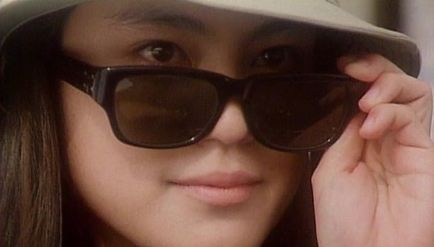
Jun Ichikawa - 1990
Panorama Entertainment Region 3 DVD
Happy Birthday, Banana!
"I sat up a little and gaze out through the saltwater spray that covered the windows at the distant line of the shore. The familiar, well-loved beach zoomed closer and closer, like a movie sped up."
from Goodbye, Tsugumi by Banana Yoshimoto
I first knew about Japanese author Banana Yoshimoto about fifteen years ago. I was working at a bookstore and her first novel, Kitchen, was just out in English. For some reason, word spread between coworkers that this was a novel to read. Since then, Yoshimoto, along with Haruki Murakami, has been one of my favorite contemporary Japanese novelists. Little wonder then that I made a point of seeing Jun Ichikawa's film from the Yoshimoto novel as the filmmaker is best known for his film Tony Takitani, from a short story by Murakami. I have yet to read Murakami's short story, so I don't know what changes he made, but I question Ichikawa's changes to Yoshimoto's short novel.
The basic story is about the friendship between two cousins in their late teen years. Maria, who has grown up in a small, seaside resort town, has moved to Tokyo to attend college. Tsugumi, slightly younger, is described as having been "born weak", and lives in defiance of everyone based on the knowledge that she is destined to die prematurely. Tsugumi knows which buttons to push, and expresses herself with anger and sarcasm. Tsugumi also exposes her more vulnerable side when she meets a young man, Yoichi. Most of the novel and film takes place during Maria and Tsugumi's last summer together.
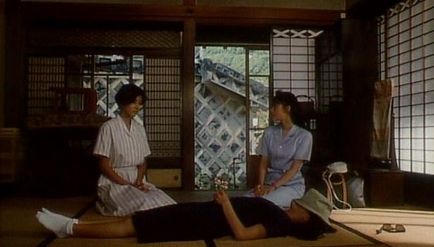
The first half hour of the film stays fairly close to the spirit and letter of the novel. There is a visual joke while Maria describes how, in spite of her name, she is unlike her namesake saint. Ichikawa films a giant cross, actually a large crosswalk in Tokyo. There are also many shots of the sea, looking out to the horizon. During the credit sequence, we see Tsugumi tormented by a little boy who loves hitting Tsugumi with a fly swatter. While the boy is peering at a small pile of garbage, Tsugumi kicks him face down into the trash. The character of the boy was not in the novel, yet that one moment better captures how I imagined Tsugumi as Yoshimoto describes her.
It is after that first half hour that Ichikawa strays from Yoshimoto's novel. Two of the bigger alterations involve Yoichi's age and occupation. In the novel, he is about Tsugumi's age, and the son of a developer who is building a large hotel that will likely put the smaller inns run by people like Tsugumi's parents out of business. In the film, Yoichi is more mature, and working at a museum. The other major change, without spoiling the plot, involves a elaborate plot conducted by Tsugumi as revenge for the death of a dog.
I might have enjoyed Ichikawa's film better also had it not been hobbled by some badly translated subtitles. As it is, this second feature by Ichikawa has much of the same formal beauty as Tony Takitani, perhaps not to be unexpected by the former director of four hundred television commercials. Ichikawa repeats certain shots in different contexts so that cherry blossoms seen in full bloom are later seen as bare trees in winter. There is a wonderful crane shot of the camera moving from Maria as she emerges from a movie theater with her mother that cranes up to the theater marquee and dissolves into a wide shot of Tokyo. Too often, Ichikawa's film goes against how I read Yoshimoto's novel, choosing to be serious and sentimental while the novel is playful and caustic.

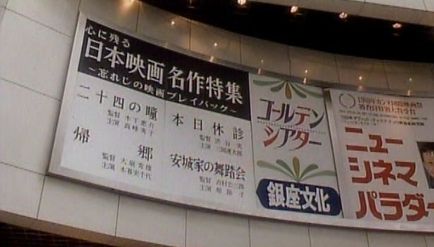
Above is a frame from the film within the film that Maria and her mother watch in the beginning of Tsugumi. Based on the name of one of the characters in that film, and from what I could identify through the Internet Movie Database, I am thinking the excerpt in question is from Meshi, a film by Mikio Naruse, released in 1951. I am not absolutely certain, but I think I noticed Setsuko Hara in the cast. As I cannot read Kanji, maybe someone will identify what is written on the marquee.
In terms of Banana Yoshimoto and film, her debut novel, Kitchen was filmed twice. I have been hesitant about getting the second version, the only one with English subtitles, as it is several minutes shorter than the original release version. It may be worth noting that Yoshimoto has named Dario Argento as her favorite filmmaker, and Robert Aldrich's Hush, Hush, Sweet Charlotte as one of her favorite films.
Posted by Peter Nellhaus at 12:41 AM | Comments (1)
July 22, 2008
Madame O

Zoku Akutokui: Joi-hen
Seiichi Fukuda - 1967
Synapse Films Region 0 DVD
Madame O may be of interest as an example of Japanese filmmaking on the fringes. As a film combining erotica and horror, the more mainstream Yasuzo Masumura's Blind Beast made just two years later is more extreme, and a far better film. I am also hoping someone will rescue Susumi Hani's Nanami: Inferno of the First Love, from 1968, one of Japan's few true independent films that more graphically explored sex and sexuality. The audience that may appreciate Madame O the most would be those most devoted to the history of the "Pink Film".
The story is about the gynecologist from hell. A female doctor, raped and infected with venereal disease as a young woman, takes revenge on men by going to bed with them, and secretly infecting them with syphilis dabbed on with a cotton swab, after making a couple of small scalpel cuts. As part of her treatment with her patients, the women may unknowingly have their tubes tied, primarily to make their husbands doubt their potency. A second, male doctor, joins the practice. Discovering his boss strapped to the stirrups for a self-performed abortion, the male doctor brings out the romantic nature of the woman who proclaimed hatred for all men. Love proves to be the undoing with the murder of a man attempting blackmail, double crosses, and an ending that is a variation on something seen in several "noir" films.
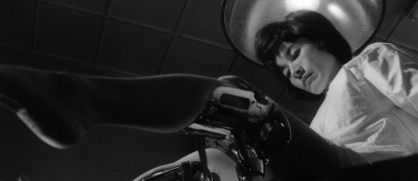
Even though the film is a sequel, at least in title, the narrative does not seem to be dependent on viewing the previous film. What reservations I have on judging Madame O stem from the indications that what is said to be the only surviving version is short by three minutes according to IMDb, and dubbed in English. Not that a complete version with Japanese dialogue may make the film any better, but it would be closer to what Seiichi Fukada had intended. How Madame O may have been altered to reflect what U.S. distributor Radley Metzger needed either for ratings or to reflect his own sensibilities is unknown.
I was also thinking about about how other filmmakers would have made Madame O. For Jesus Franco, it wouldn't be enough to hate men, the doctor would find time to make love with her comely female assistant. Had H. G. Lewis filmed Madame O, there would be more blood and shots of dismembered body parts. What may be Madame O's biggest failing is that it is too restrained in its tastelessness. Fukada jazzes up the film with a few shots in color and some stylistic flourishes. Naomi Tani, one of the most prolific actresses of "Pink Films" plays the supporting role to Michiko Aoyama who has the title role. Jasper Sharp of Midnight Eye does some heavy lifting attempting to place Madame O in the context of Japanese Cinema in the Sixties and as a surviving example of genre filmmaking with his notes that come with this DVD. For myself, it is a challenge to feel as enthused about the DVD release of Madame O when the taboo breaking films by Susumu Hani, Nagisa Oshima and Yoshishige Yoshida during that same era are available only in Japanese language versions.
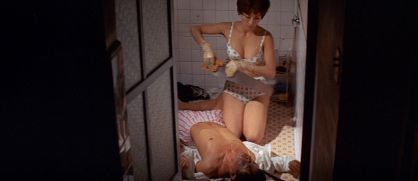
Posted by Peter Nellhaus at 12:28 AM
July 20, 2008
Coffee Break

Susan Lynch in Enduring Love (Roger Michell - 2004)
Posted by Peter Nellhaus at 12:13 AM
July 18, 2008
Richard Fleischer swings between Heaven and Hell
Just Tell Me when to Cry
Richard Fleischer - 1993
Carroll and Graf Publishers

Girl in the Red Velvet Swing
Richard Fleischer - 1955
20th Century Fox Region 1 DVD

Between Heaven and Hell
Richard Fleischer - 1956
20th Century Fox Region 1 DVD

Compulsion
Richard Fleischer - 1959
20th Century Fox Region 1 DVD

Red Sonja
Richard Fleischer - 1985
Warner Brothers Region 1 DVD
"The basic problem, of course, was the infamous studio system and its long-term contract inducement. The tantalizing lure of security was the bait in the trap. It always sounded great. A contract! No more worry about where the next job was coming from. A guaranteed income.
It was at best a mirage, at worst a fraud. The price, if you had a scrap of talent, or self-confidence, was too high. You paid with your artistic freedom and the control of your career. Security was pure illusion." - Richard Fleischer
Since Richard Fleischer's death two years ago, there has been some discussion by some about re-evaluating his films and his careers. Reading Fleischer's account of his life as a film director may spoil the claims of those who want to discuss Fleischer in auteurist terms. Unlike Frank Capra, Fleischer has no problem giving credit to others. What is written are primarily anecdotes from the set. Also unlike Capra, Fleischer never seemed to have any overriding manifesto such as "One man, one film". For Fleischer, it was to take one the best projects presented to him and make as good a film as possible. The closest Fleischer comes to suggesting that he ever had a personal project is in proposing the film that became Fantastic Voyage.

If Fleischer has any consistencies, they seem to be in attraction to films about "Crimes of the Century", and people with attempt to place themselves above laws of man or nature. Fleischer solves some of his composition problems with having his players on opposite ends of the screen in Girl in the Red Velvet Swing, a bowdlerized account of Evelyn Nesbit and Stanford White's affair in the beginning of the 20th Century. One of the attempts at experimenting with the widescreen process is of point of view shots when Joan Collins is pushed on the swing by Ray Milland. If that didn't cause some audience members to feel nauseous, than the yellow, green and turquoise costumes from a musical number might have done the trick. The subject of celebrity murder easily has its contemporary parallels which makes the subject matter continually interesting.

Between Heaven and Hell is somewhat better than the almost generic title might suggest. Robert Wagner plays a soldier busted for striking a ranking officer. He's given the choice of going to Leavenworth or joining Broderick Crawford's outpost in some remote part of the Pacific. Crawford is the kind of officer that makes The Caine Mutiny's Captain Queeg look level headed. Preferring the nickname of "Waco", Crawford is one letter short of everyone calling him Wacko. Wagner spends time reflecting on his civilian life, mistreating the share croppers on his cotton plantation. Part of the film is devoted to life lessons from Buddy Ebsen, the kind of person Wagner would have otherwise avoided. Some of Between Heaven and Hell is cornball, but the film succeeds in one key scene in depicting the literal madness of war. Terry Moore appears briefly as Wagner's wife in a few flashback scenes, that seem designed to evoke From Here to Eternity. Most of the time the film is devoted to Wagner's developing friendship with soldiers including Harvey Lembeck, Bradford Dillman and Frank Gorshin. Visually, Fleischer favors lateral tracking shots. The credit sequence is a single traveling shot, about two minutes long, of Wagner marched out of his prison cage to his commanding officer. Fleischer has nothing to say about Between Heaven and Earth in his book. If for no other reason, the film is worth watching simply to enjoy Fleischer developing ease in composing for wide screen with greater contrasts of scale in both close ups and long shots.

Fleischer returned to a new "crime of the century" with Compulsion, a fictionalized account of Leopold and Loeb. The stars, Orson Welles, Dean Stockwell and Bradford Dillman shared the Best Actor award at Cannes, while Fleischer got nominated as Best Director. The acclaim the film got was not enough to give Fleischer clout to do better than whatever projects Darryl Zanuck would assign. Fleischer would have some interesting stories to tell about Zanuck and Juliette Greco, even if the films remain largely unseen today. Orson Welles' ten minute courtroom speech is less compelling than it may have been almost fifty years ago. On the other hand, it is interesting to see how the relationship between Stockwell and Dillman is hinted at, at a time when the production code was beginning to crumble.

What is interesting also about Fleischer's autobiography, as in anyone's, is what he chooses not to write about. There is a certain amount of irony that early in his career, Fleischer was set to direct a film starring Al Jolson, then being "re-discovered" with successful film biographies that had been recently released. Jolson's unexpected death put an end to that project, but almost thirty years later, Fleischer was handed the opportunity to remake the film most associated with Jolson, The Jazz Singer. I also have to wonder if Fleischer ever discussed with Mia Farrow about his experience almost completely reshooting her father's film, His Kind of Woman on behalf of Howard Hughes. Also not noted is that about twenty years after putting his career on hold due to a lawsuit with Dino Di Laurentiis, Fleischer pretty much ended his career with films produced by the legendary producer. Red Sonja has little to recommend but I suspect that it was Fleischer who had a hand in getting George MacDonald Fraser in co-writing the screenplay. Fraser and Fleischer first worked together in a version of Prince and the Pauper titled Crossed Swords. There is one funny scene with the portly Paul Smith falling down a hole and onto a large dinner table, breaking it in two, grabbing a nearby drumstick, and asking, "How's the food here?". The main problem with most sword and sorcery films was that the films never lived up to the promise of the posters. Red Sonja is never as much fun as it should be. Zach Campbell's look at Fleischer's career make the case for how the director's consistency in spite of diminishing rewards. It's too bad that Fleischer did not write about his last film works. Red Sonja suggests that Fleischer could never fully escape from his B movie roots, and was back to making films that looked better than their limited budgets should have allowed.
Posted by Peter Nellhaus at 12:57 AM | Comments (2)
July 15, 2008
Voice
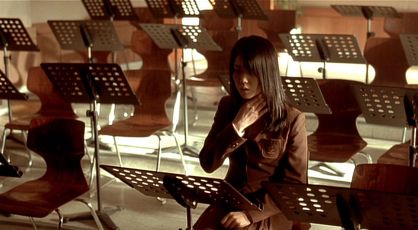
Yeogo Gwae-dam 4: Moksori
Choe Ik-Kwan - 2005
Genius Products Region 1 DVD
While it is commendable that Genius Products is stepping in to fill a void of films that might have been made available by Tartan Asia Extreme, they aren't doing anyone favors with misleading artwork. The image used for the Voicepackaging, with bloody hands emerging from a young woman's mouth is nowhere in the film, and attempts to sell a concept of gore and unrelieved horror for the less discriminating fanboy. What gore and horror actually exists in Voice is extremely limited and is hardly the point of the film. I don't know what kind of ambitions Choe Ik-Kwan may have, but in Voice he demonstrates a well developed stylist's eye that goes beyond the limits of a genre exercise.
The title is literally translated as "High School Girl's Ghost Story 4: Voice Letter". The film is not a sequel but the fourth of the loose series of ghosts stories largely taking place in a Korean high school for girls. The previous films are Whispering Corridors. Momento Mori and Wishing Stairs. The films are linked by an intense friendship between two students, the mysterious death of a student in the past, and a mysterious teacher. Given that the films are about young women, there is nothing exploitive about the films, made primarily for an audience of older teens. The films are also critical about some aspects of Korean education.
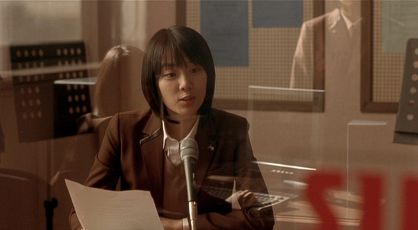
Voice visually explores the idea of high school as a form of hell. At night, the hallways are bathed in red light. Parts of the film take place in the school's basement, corridors of leaky pipes and rot which belies the gleaming modernity of the school's exterior and above ground structure. Even the concept of the elevator or simply the elevator shaft for a one way decent is used here. What makes Voice different from most ghost stories is that part of the film is told from the point of view of the ghost, a young woman who is finds that she may be invisible to most of her classmates, yet is physically limited to the school building in her afterlife.
Voices figure into the story. The main character, Young-Eon, is a student with an extraordinary singing voice. Young-Eon's relationship with the music teacher becomes the subject of rumor. The teacher is a former soprano who is noted for wearing turtlenecks to cover her throat. Young-Eon's best friend, records Young-Eon's voice and has a lunchtime "radio" show broadcast in the school. Part of the mystery involves the voice of an unseen singer that only a few of the girls can hear. Another student, who has had the ability to hear ghosts, comments ominously that ghosts are selective in their memories.
Memory is what Voice explores. It is not only ghosts who have faulty memories as the film demonstrates. One of the less sensitive students states that that one of the rumors about Young-Eon must be factual because it has been repeated so often. Within the confines of the ghost genre is the story about the conflicts young people have between wanting to be part of the crowd against making one's self distinguished by a special talent. The few adults that appear in Voice have a tendency to be useless, with the exception of the one teacher who recognizes the talents of her students. For me, Voice suggests again that Korea has been a hotbed of talented visual stylists. While it will be a few years before we see how the careers of the directors develop, I would make the case that the series of ghosts stories may be viewed in the future as the starting point for new talent much in the way that the Val Lewton produced horror film served in the past.

Posted by Peter Nellhaus at 06:43 PM
July 13, 2008
Coffee Break

Edward G. Robinson and Ellen Corby in Illegal (Lewis Allen - 1955)
Posted by Peter Nellhaus at 12:51 AM
July 11, 2008
Mitchum in the Middle

Man in the Middle
Guy Hamilton - 1963
20th Century Fox Region 1 DVD

El Dorado
Howard Hawks - 1966
Paramount Region 1 DVD
A couple of weeks ago, I read Lee Server's biography of Robert Mitchum. If there was ever an example of "too much information", it could be found in this book. Based at least in part on the kind of public persona Mitchum displayed, Server thought that Robert Mitchum should have been a more significant star in the the Sixties. Seen together, Man in the Middle and El Dorado serve as a double feature with Mitchum playing characters with a limp. The characters also provide an unintended symbolism of Robert Mitchum's career in advanced middle age.
Man in the Middle is one of those films that suggests greater potential than what was realized on screen. The World War II begins with an American officer shooting a British soldier point blank, in front of several witnesses. Robert Mitchum plays the Lieutenant Colonel asked to defend the officer, portrayed by Keenan Wynn. Mitchum is assured that Wynn is to get a fair trial even though his guilt is assumed as about a dozen soldiers witnessed the act. In attempting to get evidence to defend Wynn, Mitchum finds a variety of obstacles created by army bureaucracy. Mitchum eventually realizes that the trial is mostly for show, and that any dreams of promotion are tied up with his playing the game.

Mitchum gets his first big clue from France Nuyen, the beautiful nurse with a sense of integrity. The film tips its hand pretty early in suggesting that Wynn may be capital letter CRAZY. Even worse, Wynn's character is a racist. The question may be, is Wynn crazy because he's a racist, or a racist because he's crazy? One could also view Man in the Middle as a kind of companion piece to Crossfire, with Mitchum also taking on the Robert Young role. In the older film, Robert Mitchum could not possibly have been the murderer of the Jewish soldier, primarily because he's Robert Mitchum and too damn cool. In Man in the Middle, it is axiomatic that Mitchum will prevail without much sweat. Considering the literary source, a novel by Howard Fast, with a screenplay by Willis Hall and Keith Waterhouse, there is little of the tension between loyalty and idealism that another actor might have conveyed.
Marlon Brando had the film rights before changing his mind about being in the film. Might Mitchum have done Man in the Middle to dispel rumors of his own rumored racism that dogged him following his rejection of the starring role in The Defiant Ones? Man in the Middle is less incisive than it might have been. What remains is a gallery of effective supporting actors including Trevor Howard, Sam Wanamaker and Barry Sullivan to help make the film watchable if not overly meaningful.
Mitchum limps again in El Dorado. Server writes about how the original film was to be more serious until Howard Hawks and John Wayne pushed screenwriter Leigh Brackett to duplicate Rio Bravo as much as possible. By the time he made El Dorado, Mitchum's own aversion to acting became more pronounced. Second billed to John Wayne, Mitchum appears in half of the film. Mitchum's character is named J.P. Harrah, but the film is mostly Howard Hawks' last hurrah, one last attempt to reclaim commercial viability after that failures of Man's Favorite Sport? and Red Line 7000. I had forgotten that Hawks redoes the ending of El Dorado with his final image of John Wayne limping into the fadeout of Rio Lobo. I know there are some who love El Dorado. Too often, I got the feeling that Rio Bravo was a river that should have been best visited once.

Posted by Peter Nellhaus at 12:13 AM | Comments (3)
July 08, 2008
Pleasure Factory

Kuaile Gongchang
Ekachai Uekrongtham - 2007
Strand Releasing Region 1 DVD
Four years after making Beautiful Boxer, it is discouraging to report on the disappointment of Ekachai Uekrongtham's return to filmmaking. Set in Singapore's red light district, Pleasure Factory lacks those elements that made Beautiful Boxer so compelling, primarily a dramatic story, a charismatic star, and the element of transgressive sexuality. Ekachai's attempt to present three loosely connected stories about some of the residents and patrons of the Geylang district seem to suffer from being to vague, perhaps also the result of relying on the abilities of non-actors to improvise, and well as scenes of silence that fail to communicate anything meaningful.
The film begins with a written introduction noting that the Geylang area was originally an industrial zone. Ekachai reminds the audience that sex work is work, with the exchange of cash for labor. The high definition video and harsh lighting further emphasize the factory, more than any pleasure. The use of hand-held cameras also adds to a documentary feel.

The most effective part of the film is the story of a young, inexperienced soldier who spends to the night with an equally young prostitute. The soldier sits on one side of the bed while the prostitute patiently waits for him to make is move. Having only the dimmest knowledge of safe sex, the soldier show a collection of several boxes of different condoms, asking the prostitute to choose one. Briefly the soldier feels infatuated with the prostitute. For a moment, the two are like a young couple, attracted to each other but awkward in expressing mutual affection. In another scene, a popular prostitute, coming home from a tryst with a client, pays a street musician to spend the night with her, sitting together holding hands in silence.
Pleasure Factory begins with the image of another prostitute looking at fish in a pet store, and ends with her boyfriend staring at his small aquarium. I have to assume that this is Ekachai's metaphor for the people of Geylang, able to move within a limited area, but also trapped with nowhere to go, and essentially disposable. Unlike Beautiful Boxer which challenged the viewer not to feel sympathetic towards a champion Thai boxer whose goal was to live as a transgender woman, Pleasure Factory offers little that has not been expressed by others in recognizing the humanity of women who by choice or circumstance are sex workers. The effect of his newest film is that what ever potential Ekachai may have assumed his subject possessed, it is as if he discovered too late that he really had nothing to say.

Posted by Peter Nellhaus at 04:56 PM
July 06, 2008
Coffee Break
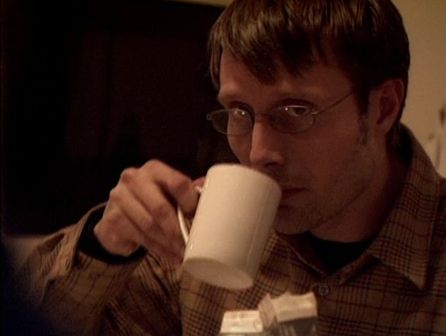
Mads Mikkelsen in Open Hearts (Susanne Bier - 2002)
Posted by Peter Nellhaus at 12:13 AM
July 03, 2008
The Booth

Busu
Yoshihiro Nakamura - 2005
Tartan Asia Extreme Region 1 DVD
I only have a couple more titles to go before I have seen every Tartan Asia Extreme DVD available from the Denver Public Library. The Booth is a pretty good little film that is closer in spirit to the films by Yoshitaro Nomura than to contemporary Japanese horror films. The story is about the final night of a Tokyo disc jockey who hosts a talk show devoted to advice for the lovelorn. Due to a move by the radio station, the show is done in the booth that developed a reputation for being haunted when a DJ with a similar show, hung himself. The lesson is that hurtful words can literally come back to haunt you. At less than 75 minutes, Nakamura creates suspense through sound and flashbacks that only partially reveal the truth.
With the discussion about the end of Tartan as a label, comes some some negative comment about Tartan Asia Extreme. While the label probably painted itself into a corner by concentrating on genre films, that these films were made available for US audiences should be appreciated. Some of the films in their library were better than others. The one Tartan Asia Extreme release I was unable to sit through was the GCI heavy Korean science-fiction film, Natural City. For myself, some of the criticism toward Tartan Asia Extreme smacked of snobbery towards genre filmmaking as well as disinterest in examining differences in Asian culture.
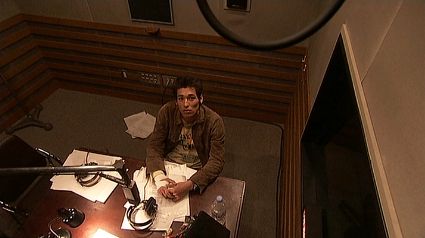
In his book, The American Cinema, Andrew Sarris discusses the problems of appreciating certain filmmakers who are associated with specific genres. The western isn't just pantheon directors John Ford or Howard Hawks, but also John Sturges, Anthony Mann, Henry Hathaway and even William Whitney. The MGM musical is not just Vincente Minnelli and Stanley Donen, but also Charles Walters, George Sidney and Don Weis. The Italian western is not just Sergio Leone, nor is Dario Argento the only giallo filmmaker worth investigating. Additionally, one would expect there to be acknowledgment of the country of origin and if needed, some discussion on how that impacts a film. What genuine film scholarship has shown over the years is that the importance of a film does not always relate to the genre or even to the critical reception the film may have initially been accorded. Keep in mind that four time Oscar winner John Ford never was awarded for a western.
The Malaysian, The Maid, for example, may owe much of its style and subject matter to the ghost stories of its Asian neighbors. The film also serves as a critique of the treatment of Filipinas, as well as the influence of Chinese culture in Malaysia. Being a film fan without discrimination is just the flip side of being a film critic who doesn't bother looking beyond the surface of the genre or country of origin.
For myself, it was viewing genre films that has helped fuel my interest in the works of films and filmmakers who might fall outside the description of "extreme". While I would have preferred a US DVD release of The Unseeable or Alone, hopefully The Victim may stir interest in not only Thai ghost stories, but Thai cinema in general. While I did not care for Phone, this is a film with some very enthusiastic defenders. Not every film in the Tartan Asia Extreme library was in the class of Oldboy. Still, considering the spotty availability of any Asian films for US film fans and scholars, Tartan should still be appreciated for what they did right.

Posted by Peter Nellhaus at 07:54 AM | Comments (1)
July 01, 2008
Only the Valiant

Gordon Douglas - 1951
Lionsgate Region 1 DVD
The most encouraging aspect about Lionsgate releasing a DVD from their Republic Pictures library is that it may mean other films, hopefully Moonrise and China Gate will get overdue DVDs. Even among the films of Gordon Douglas or star Gregory Peck, Only the Valiant is a decidedly minor film with minor virtues. I was hoping to see more of Barbara Payton in her second to last film for a big studio before alcohol and general bad behavior exiled her from Hollywood. Not that Only the Valiant was a major film. The project smacks of Warner Brothers looking for a way to fulfill contracts with employees, and provide product for their theaters.
Gregory Peck plays an Army captain with the very unsubtle name of Dick Lance. Barbary Payton is the officer's daughter who is hoping to get his attention. In the meantime, Gig Young lets his feelings for Payton be known, and is seen kissing Payton accidentally by Peck. Orders to escort an Apache warrior are changed by the commanding officer in spite of Peck's protest so that Young goes on a mission that means possible death. Of course Peck gets blames for the change of orders when Young gets killed. Peck then takes the soldiers he considers the most expendable for what is more clearly a suicide mission to stop several hundred indians before the reenforcement troops show up.

Only the Valiant is not quite the "Dirty Half Dozen", but the twist is wondering whether these soldiers who have no love for each other will destroy each other before getting the Indians. The psychological aspects are as broad as the characters actors filling the parts - Ward Bond as the very Irish, perpetually inebriated Corporal, Neville Brand as the bullying Sergeant, and Lon Chaney, Jr. as the large and angry Trooper Kebussyan. If you're looking for a film with more serious thoughts about relationships with the Native American, you would have to look at Delmer Daves' < b>Broken Arrow released the year before. Still, having much of Only the Valiant take place at night serves as a visual compliment to the darkness of the characters, and the long shots of the virtually abandoned fort that Peck and company defend give the film a noirish quality.
To what extent the look of Only the Valiant should be credited to cinematographer Lionel Lindon I couldn't say, but there are some visually stunning moments, especially a shot of Peck and his troops seen riding in silhouette. There may possibly be a message about the dehumanizing effects of war when the day is saved by that new invention, the Gatling gun, which mows down the Apaches by the dozens. On the debit side, having Ward Bond as a drunk soldier with a heavy brogue is too much of a reminder of his membership with John Ford's stock company, and the kind of role Ford would give to Victor McLaglen in films that would be relatively fresh in the memory of the audience watching Only the Valiant. The effect is that the makers of Only the Valiant had thought about making a different kind of western only to retreat back to familiar cliches.

Posted by Peter Nellhaus at 08:49 PM | Comments (1)